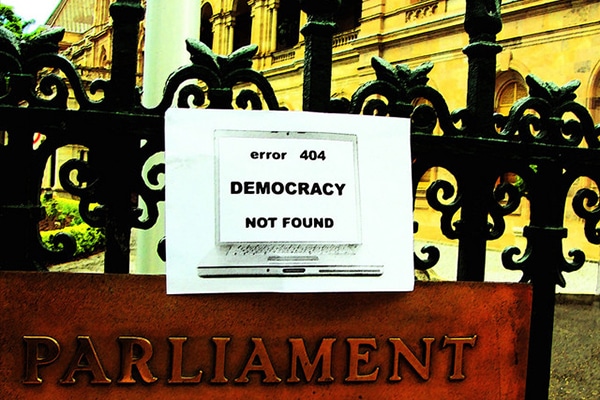
Democracies are on the defence. In its recent National Security Strategy, the Trump Administration –advocating ‘a return to a principled realism’– fails to mention promoting democracy and human rights beyond US borders, although it does refer to ‘our community of like-minded-democratic states’. The EU has its own democracy problems with Poland and Hungary, and the lack of effective mechanisms for dealing with them deprives it of credibility both internally and externally. Even the expansion of the EU is no longer a guarantee of the democratisation of the new states that join. Prior to the advent of Trump, the EU had already lowered its expectations of non-European countries with its 2016 Global Strategy.
The fact that democracies have stopped exporting their model is not in itself negative, in the light of recent disastrous excesses. The last time the US tried it on a large scale, under a Bush Administration dominated by neo-conservatives who drove the idea, was the invasion of Iraq in 2003, which led not only to a civil war but also the emergence of the Daesh/Islamic State brand of terrorism, which has not died with the loss of its territorial base but is rather mutating. The case of Libya also remains unresolved. The EU’s support for General Sisi’s coup in Egypt –which it did not dare to describe as such– damaged the credibility of the its efforts to defend and promote democracy and human rights abroad. The most it now promotes in non-European states is a more or less predictable rule of law and the strengthening of civil societies by, for example, shoring up health, education and connectedness.
It is true that democracies are vying in theatres such as Africa with powers like China that do not tie their aid, trade agreements and investments to respect for democratic norms or human rights, although neither China nor Russia try to export their model (unlike the situation in the Cold War). However, the US National Security Strategy sees an ideological struggle being waged here with Russia and China. The Chinese model of economic success and political stability may prove attractive to some developing countries. This stands in contrast to the sometimes disorderly impression given by Europe and even the US, where the budget allocated to the State Department (responsible for diplomacy and aid) is on the wane while the Pentagon’s grows.
‘Democracy is in crisis’, announced Freedom House, a US-funded organisation, in its Freedom in the World 2018 report. It claims that for the twelfth year running the number of countries that have gone backwards in democratic terms exceeds those that have advanced. There is a falling back. Some countries in this period have tipped towards authoritarianism, not only Hungary, but also Turkey, which under Erdoğan has returned to a more despotic and less liberal system in political, cultural and religious terms. Countries generally thought of as democracies are also experiencing problems, witness the rise of populist and anti-establishment forces (Italy providing the latest case in point).
Democracies are going through a crisis of self-confidence. They would not otherwise show so much fear of the social media disinformation campaigns emanating from centres in Russia and elsewhere, however serious and worrying such political warfare might be. Democracies need to change and adapt to the new times, and harness the collective intelligence referred to by Geoff Mulgan. A Pew survey conducted last year suggested that a majority (78%) of the world’s citizens support representative democracy, but 66% (in the 38 countries polled) want greater participation and more direct democracy. Up to 49%, however, voice support for government by experts –technocracy– while no less than 29% advocate a strong leader or a military government.
Some authoritarian systems and dictatorships are becoming more hard-line. Under Putin and his ideology, Russia is set to hold presidential elections on 18 March, which the incumbent would have won anyway (although probably not with the 70% turnout and 70% of the popular vote he covets) without resorting to so many ruses and restrictions. It is a country that under Yeltsin was becoming more democratic (and foundering), and has gone into reverse in democratic terms (although recovering in geopolitical and self-confidence terms) under Putin, who is admired by extreme-right leaders in the West such as Marine Le Pen.
The paradigmatic case is provided by Xi Jinping’s China. It is the system that wields most control over its citizens, thanks to the new technologies of which the Chinese themselves are such prolific users. Its citizens lack any significant appetite for democracy, but they do covet more freedom (to consume, but also to express themselves) and a rule of law (in order to know what it is they are dealing with and to halt corruption). The National People’s Congress has bowed to the will of Xi and the Communist Party and done away with the constitutional principle limiting the Premier and the General Secretary of the Party to serving two terms. Xi has thus turned disregarded the power-limiting rules introduced by Deng Xiaoping in the wake of Mao Tse Tung’s excesses, which collectivised power in the Standing Committee of the Politburo and established term limits; Deng’s reform had been effective in constantly renewing the leadership, forestalling a cult of personality… until now. The regime claims that it is relying on popular support for taking a step that evokes an imperial past.
Trump’s reaction to the news, albeit uttered at a private meeting, was regrettable: ‘He’s now President for life. President for life. No, he’s great. And look, he was able to do that. I think it’s great. Maybe we’ll have to give that a shot some day’. Trump for life? The US may be becoming more withdrawn, but at least the institutions are still working.
The retreat of democracies could also start to be a concern for global order (the Chinese always prefer to talk of harmony rather than order), which is reverting to rivalry between great powers that are very different from one another. For these democratic retreats are usually accompanied by greater nationalism and assertions of sovereignty (a phenomenon from which democracies have not been exempt, as has been apparent with Brexit and Trump). As John Ikenberry points out, the crisis of the liberal international order is due not only to geopolitical factors, or the fact that the new/old powers are promoting a different, parallel order, but also to the crisis of the democracies themselves after their apparent ‘victory’ in the Cold War, and their withdrawal from the debate about their legitimacy and the social goals of their systems and from the world order itself. Democracies have put themselves on the back foot, forgetting at times their raison d’être. Dangerous.


